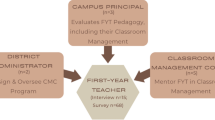Abstract
The gulf between educational leadership theory and contemporary curriculum scholarship is becoming increasingly problematic now that principals have been legally mandated to add curriculum monitoring to their duties as instructional leaders. Lacking familiarity with curriculum theory and practice, many overburdened administrators are turning to Management by Walking Around (MBWA) as a way of dealing with their ever burgeoning list of responsibilities. This article briefly reviews a particular MBWA model, the Three-Minute Classroom Walk-Through (Downey et al. 2004) and then interprets it through the lens of Henderson and Kesson’s (2004) arts of inquiry, a heuristic developed for helping curriculum workers think through the current multitude of reform proposals. This provides one example of the way that dialogue between the fields of curriculum studies and educational leadership may augment possibilities for lasting and positive reform of instructional supervision.
Similar content being viewed by others
Notes
Henderson and Gornick (2007) have revised the model in a way that positions the mode of phronesis or “practical judgment” as the overall process rather than one of the seven modes. This is consistent with our own understanding of phronesis as “the goal, guide, and source” (Brooks 2000) of hermeneutic inquiry and is the way we have approached our use of the model in this project.
References
Allen, L.A. & Brooks, N.J. (2006). “Drive-bys, Shoot-em Ups, and Take No Prisoners”: The Unintended Consequences of Supervisory Practices or Looking for Curriculum Wisdom in all the Wrong Places. Paper presented the 2006 Curriculum and Pedagogy Conference, Balcones Springs, TX, October.
Brooks, N.J. (2000). Re/searching the Reconceptualization: A Hermeneutic Inquiry. Doctoral dissertation, Oklahoma State University, 2000.
Csikszentmihalyi, M. (1990). Flow: The Psychology of Optimal Experience. New York: Harper & Row.
Downey, C.J., Steffy, B.E., English, F.W., Frase, L.E. & Poston, Jr., W.K. (2004). The Three-minute Classroom Walk-through: Changing School Supervisory Practice One Teacher at a Time. Thousand Oaks, CA: Corwin Press.
Dufour, R. (2002). The Learning-centered Principal. Educational Leadership 59(8), 12–15.
English, F.W., Holland, P.E., Lambert, L., Henderson, J.G., Hlebowitsch, P. S. & Kesson, K.R. (2004). Curriculum Leadership: A Conversation Between Divisions A & B. Symposium conducted at the 2004 Annual AERA meeting, San Diego, CA, April.
Fendler, L. (2003). Teacher Reflection in a Hall of Mirrors: Historical Influences and Political Reverberations. Educational Researcher 32(3), 16–25.
Foucault, M. (1979). The History of Sexuality, Volume One: An Introduction. (R. Hurley, Trans.) London: Allen Lane. (Original work published in 1976)
Frase, L. & Hetzel, R. (1990). School Management by Wandering Around. Lancaster, PA: Technomic.
Halverson, R., Kelley, C. & Kimball, S. (2004). Implementing Teacher Evaluation Systems: How Principals Make Sense of Complex Artifacts to Shape Local Instructional Practice. In W.K. Hoy & C.G. Miskel (Eds), Educational Administration, Policy, and Reform: Research and Measurement (pp. 153–188). Greenwich, CT: Information Age Publishing.
Henderson, J.G. & Gornick, R. (2007). Transformative Curriculum Leadership (3rd edition). Upper Saddle River, NJ: Prentice-Hall.
Henderson, J.G. & Kesson, K.R. (2004). Curriculum Wisdom: Educational Decisions in Democratic Societies. Upper Saddle River, NY: Pearson.
Hoy, A.W. & Hoy, W.K. (2006). Instructional Leadership: A Research-based Guide to Learning in Schools (2nd edition). Boston, MA: Allyn & Bacon.
Kmetz, J.T. & Willower, D.J. (1982). Elementary School Principals’ Work Behavior. Education Administration Quarterly 18(4), 62–78.
Murphy, J. & Hallinger, P. (1992). The Principalship in an Era of Transformation. Journal of Educational Administration 30(3), 77.
Peters, R.H. & Waterman, T.J. (1982). In Search of Excellence: Lessons from America’s Best-run Companies. New York: Harper & Row.
Pierce, M. (2000, September/October). Portrait of the ‘Super Principal.’ Harvard Education Letter. Retrieved July 30, 2006, from http://www.edletter.org/past/issues/2000-so/principal.shtml.
Pinar, W.F., Reynolds, W.M., Slattery, P. & Taubman, P.M. (1995). Understanding Curriculum. New York: Peter Lang.
Rose, R. & Parsons, L. (1998). Supporting the Subject-coordinator Through the Process of Curriculum Monitoring in a Special School. Support for Learning 13(1), 21–25.
Author information
Authors and Affiliations
Corresponding author
Rights and permissions
About this article
Cite this article
Brooks, N.J., Solloway, S.G. & Allen, L.A. Instructional Supervision and Curriculum Monitoring: Reinterpreting the Principal’s Role through the Arts of Inquiry. J Pers Eval Educ 20, 7–16 (2007). https://doi.org/10.1007/s11092-007-9031-x
Received:
Accepted:
Published:
Issue Date:
DOI: https://doi.org/10.1007/s11092-007-9031-x




